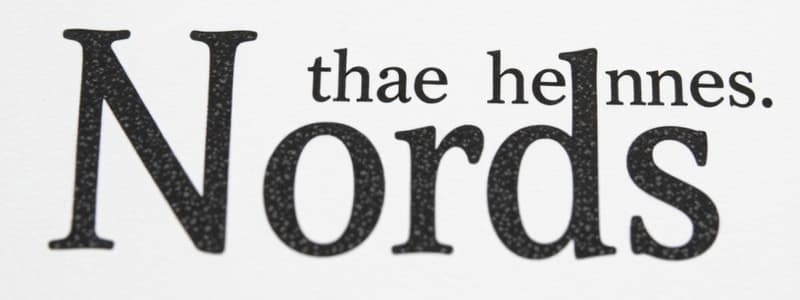Podcast
Questions and Answers
What defines homophones?
What defines homophones?
- Same spelling, different meanings
- Different pronunciation, same spelling
- Same pronunciation, different spelling and meanings (correct)
- Same meaning, different spelling
Which of the following is an example of a homonym?
Which of the following is an example of a homonym?
- bat - bat (correct)
- bow - bow
- fair - fare
- here - hear
How do homographs differ from homophones?
How do homographs differ from homophones?
- They are pronounced the same.
- They are spelled the same but have different pronunciations. (correct)
- They are spelled differently.
- They have the same meanings.
Why is it important to learn multiple-meaning words?
Why is it important to learn multiple-meaning words?
Which pair of words demonstrates a homophone?
Which pair of words demonstrates a homophone?
Which option correctly identifies the use of the noun in the provided example?
Which option correctly identifies the use of the noun in the provided example?
Which of the following correctly describes a homophone?
Which of the following correctly describes a homophone?
What defines a homonym according to the provided definitions?
What defines a homonym according to the provided definitions?
Which sentence illustrates the correct use of the verb 'leave' in past tense?
Which sentence illustrates the correct use of the verb 'leave' in past tense?
Which option provides a correct example of a homograph?
Which option provides a correct example of a homograph?
Flashcards
Multiple-Meaning Words
Multiple-Meaning Words
Words that have the same spelling or sound but different meanings.
Homophone
Homophone
Words that sound the same but are spelled differently and have different meanings.
Homonym
Homonym
Words that sound the same and are spelled the same but have different meanings.
Homograph
Homograph
Signup and view all the flashcards
Box (verb)
Box (verb)
Signup and view all the flashcards
Examples of Homophones
Examples of Homophones
Signup and view all the flashcards
Examples of Homonyms
Examples of Homonyms
Signup and view all the flashcards
Study Notes
Multiple-Meaning Words
- Multiple-meaning words have the same spelling or sound but different meanings.
- Examples include "dog bark" and "tree bark", "bus fare" and "county fair".
- Word meaning depends on its use in a sentence.
- Example: "I got you a present!" and "Let me present my screen to you!"
Importance of Learning Multiple-Meaning Words
- Enlarges vocabulary.
- Prevents miscommunication with others.
- Improves reading comprehension.
Types of Multiple-Meaning Words
-
Homophone: Same pronunciation, different spelling, different meanings.
- Examples: "here" and "hear", "red" and "read".
-
Homonym: Same pronunciation, same spelling, different meanings.
- Examples: "bat" (animal) vs. "bat" (baseball bat), "fly" (insect) vs. "fly" (to travel by air).
-
Homograph: Different pronunciation, same spelling, different meanings.
- Examples: "bow" (weapon) vs. "bow" (movement of the head), "lead" (material) vs. "lead" (to guide).
Sample Sentences for Practice
- Study examples to help form correct sentences with homophones, homonyms, and homographs.
Correct Use of Verbs and Nouns
- Example questions on using verbs and nouns correctly in sentences, along with correct answers.
- Example question on "box" and its correct use as a verb.
- Example question on "jam" and its correct use as a noun.
- Example question on "fly" as a noun (insect).
- Example question on "left" as a verb ("to go away from").
Studying That Suits You
Use AI to generate personalized quizzes and flashcards to suit your learning preferences.




